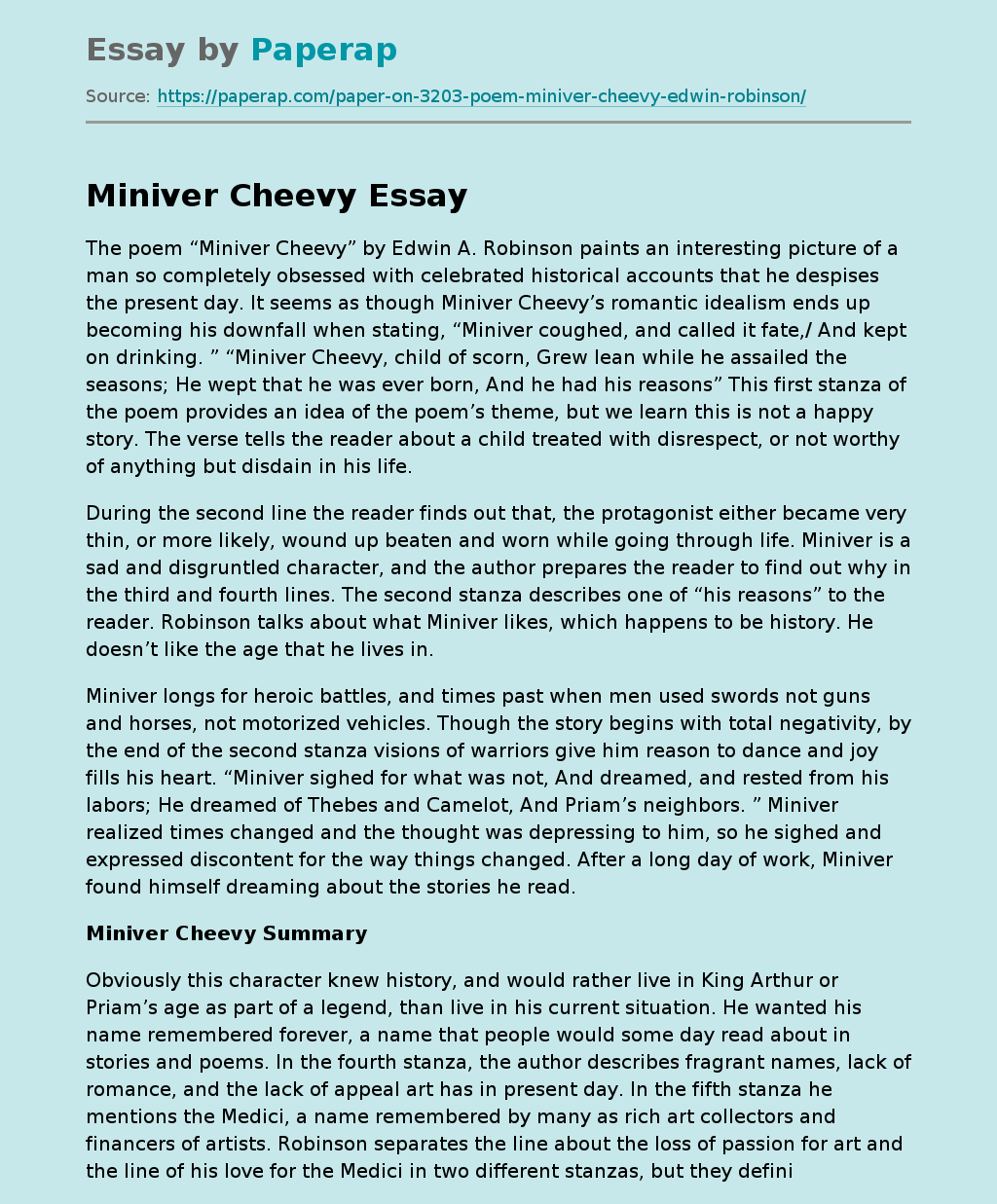Obsession in Miniver Cheevy
The poem “Miniver Cheevy” by Edwin A. Robinson paints an interesting picture of a man so completely obsessed with celebrated historical accounts that he despises the present day. It seems as though Miniver Cheevy’s romantic idealism ends up becoming his downfall when stating, “Miniver coughed, and called it fate,/ And kept on drinking. ” “Miniver Cheevy, child of scorn, Grew lean while he assailed the seasons; He wept that he was ever born, And he had his reasons” This first stanza of the poem provides an idea of the poem’s theme, but we learn this is not a happy story.
The verse tells the reader about a child treated with disrespect, or not worthy of anything but disdain in his life.
During the second line the reader finds out that, the protagonist either became very thin, or more likely, wound up beaten and worn while going through life. Miniver is a sad and disgruntled character, and the author prepares the reader to find out why in the third and fourth lines.
The second stanza describes one of “his reasons” to the reader. Robinson talks about what Miniver likes, which happens to be history. He doesn’t like the age that he lives in.
Miniver longs for heroic battles, and times past when men used swords not guns and horses, not motorized vehicles. Though the story begins with total negativity, by the end of the second stanza visions of warriors give him reason to dance and joy fills his heart. “Miniver sighed for what was not, And dreamed, and rested from his labors; He dreamed of Thebes and Camelot, And Priam’s neighbors.
” Miniver realized times changed and the thought was depressing to him, so he sighed and expressed discontent for the way things changed. After a long day of work, Miniver found himself dreaming about the stories he read.
Miniver Cheevy Summary
Obviously this character knew history, and would rather live in King Arthur or Priam’s age as part of a legend, than live in his current situation. He wanted his name remembered forever, a name that people would some day read about in stories and poems. In the fourth stanza, the author describes fragrant names, lack of romance, and the lack of appeal art has in present day. In the fifth stanza he mentions the Medici, a name remembered by many as rich art collectors and financers of artists. Robinson separates the line about the loss of passion for art and the line of his love for the Medici in two different stanzas, but they definitely relate.
Then, he speaks a piece of truth that we hear nowhere else in the poem. When speaking about the Medici he states, “He would have sinned incessantly,” which tells the reader he may have another problem in his life. Something about having too much money and power would either cause him to be evil, or he feels that money causes sin in people’s lives. In the sixth stanza he reverts to negative thoughts about his life. “Miniver cursed the commonplace,” states Robinson as he speaks of the character’s mediocrity and how it angers him.
Upon seeing a khaki suit, he feels disgusted with common clothes; he would rather walk around in uncomfortable iron clad armor than clothes of his era. He makes an interesting comparison of a khaki suit, the typical business wear of his day, to one made of iron which signified knights and heroes in his historical recollections. In the following stanza, the protagonist thinks about how despicable a job he has or the way he earns money, but without money and that job he would become more agitated. Robinson then describes Miniver’s biggest problem. He thinks too much.
All of his thinking causes these comparisons of his life to days in the past, to stories and legends that he could not aspire to compare. “Miniver Cheevy, born too late, Scratched his head and kept on thinking; Miniver coughed, and called it fate, And kept on drinking. ” All appearances show Miniver as an educated man, yet living in a constant state of nostalgia and depression. The protagonist feels trapped inside a reality that he does not want, and does everything he can to undo that reality in his mind. In this last stanza, Robinson tells the reader Miniver was born in the wrong era, a man this set on glory should have been born many years earlier.
It seems he felt the same as many people have felt these days, and that problem focused on idealizing and romanticizing about the past. This desire develops in so many as a way to escape the present, more than actually wanting to live in the past. Evidently Miniver was trying to escape his present situation and his mode of escape was alcohol and dreaming.
Obsession in Miniver Cheevy. (2019, Dec 05). Retrieved from https://paperap.com/paper-on-3203-poem-miniver-cheevy-edwin-robinson/

